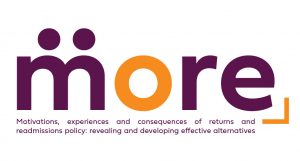
MORE: Motivations, experiences and consequences of returns and readmissions policy: revealing and developing effective alternatives
The returns and readmissions policies constitute an essential part of the European Union and its member states’ response to irregular migration. These policies have led to a reduction in pathways to safeguard the rights of migrant populations across Europe. The increasingly restrictive interpretations of the Returns Directive, along with intensified efforts to facilitate returns and deportations, have contributed to severe human rights violations. These interpretations primarily focus on increasing the number of returns and expulsions, under a paradigm of the “ineffectiveness” of these policies, which polices and criminalises migratory movements.
Within this framework, on October 1st, the research project MORE: Motivations, experiences, and consequences of returns and readmissions policy: revealing and developing effective alternatives began, coordinated by the European Social Research Unit of the Department of Social Anthropology led by Olga Jubany as the Principal Investigator. The project is funded by the Horizon Europe program and has a duration of three years. MORE involves the participation of prestigious research entities such as the University of Oxford, the Université Libre de Bruxelles, and the Università Ca’Foscari in Venice, among others. The research combines qualitative and quantitative methods in 13 countries, including countries outside the European Union.
MORE aims to critically examine returns and readmission policies at the level of the European Union, six member states, and the United Kingdom, analysing their origins, rationale, and purposes. MORE contends that return policies begin with a flawed premise of seeking “solutions” to irregularity when this irregularity is created by migration policies themselves.
MORE delves into the production of these policies, going beyond a documentary analysis to see how they become a “reality” through an ethnographic approach to the daily work of state and non-state actors involved in their implementation. At the same time, MORE will examine the interplay between public discourse and migration policies by creating and analysing a database of public opinion regarding return policies. Thus, MORE is grounded on the idea that only by adopting a critical perspective on the origins and development of these public policies can we decipher the implications of their articulation and implementation and begin to understand the full extent and repercussions of their impact on the lives of people at risk of being deported to Europe.
Therefore, MORE includes in its research the perspectives and experiences of those individuals directly affected by these policies. Through an eminently ethnographic approach and using participatory methods, MORE examines the consequences of return policies in daily life and society based on the experiences of people at risk of deportation and their support networks.
